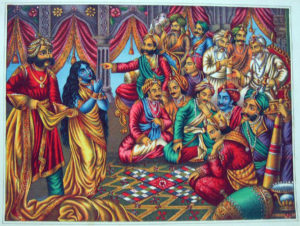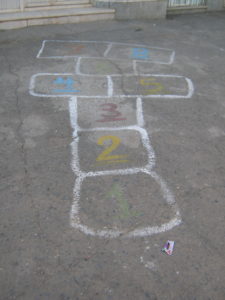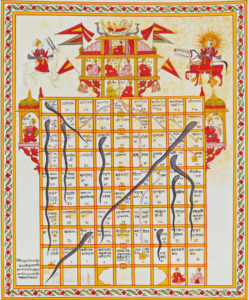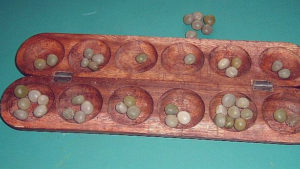The board game you are playing is one of many board games that have long histories in India. This one is played in many places and so goes by different names and has several variations.
Some of India’s games have become known outside of India and will probably seem quite familiar to you.
 Pachisi (पचीसी in Hindi) is a cross and circle board game that originated in medieval India which has been described as the national game of India. It is played on a board shaped like a symmetrical cross. A player’s pieces move around the board based upon a throw of six or seven cowrie shells, with the number of shells resting with aperture upwards indicating the number of spaces to move. You might recognize it in the version created by Parker Brothers, “Parcheesi”.
Pachisi (पचीसी in Hindi) is a cross and circle board game that originated in medieval India which has been described as the national game of India. It is played on a board shaped like a symmetrical cross. A player’s pieces move around the board based upon a throw of six or seven cowrie shells, with the number of shells resting with aperture upwards indicating the number of spaces to move. You might recognize it in the version created by Parker Brothers, “Parcheesi”.
 Pandi Attam (பாண்டி அடம் in Tamil) is a popular playground game in which players toss a small object into numbered spaces of a pattern of rectangles outlined on the ground and then hop or jump through the spaces to retrieve the object. Children all over the world play this game you might recognize as “hopscotch”.
Pandi Attam (பாண்டி அடம் in Tamil) is a popular playground game in which players toss a small object into numbered spaces of a pattern of rectangles outlined on the ground and then hop or jump through the spaces to retrieve the object. Children all over the world play this game you might recognize as “hopscotch”.
 Moksha Patamu (मोक्ष पटमु in Hindi) is played between two or more players on a game board having numbered, gridded squares. A number of “ladders” and “snakes” are pictured on the board, each connecting two specific board squares. The object of the game is to navigate one’s game piece, according to die rolls, from the start (bottom square) to the finish (top square), helped or hindered by ladders and snakes respectively. The historic version had root in morality lessons, where a player’s progression up the board represented a life journey complicated by virtues (ladders) and vices (snakes). A commercial version with different morality lessons, “Chutes and Ladders”, is published by Milton Bradley.
Moksha Patamu (मोक्ष पटमु in Hindi) is played between two or more players on a game board having numbered, gridded squares. A number of “ladders” and “snakes” are pictured on the board, each connecting two specific board squares. The object of the game is to navigate one’s game piece, according to die rolls, from the start (bottom square) to the finish (top square), helped or hindered by ladders and snakes respectively. The historic version had root in morality lessons, where a player’s progression up the board represented a life journey complicated by virtues (ladders) and vices (snakes). A commercial version with different morality lessons, “Chutes and Ladders”, is published by Milton Bradley.
 Pallankuli (பல்லாங்குழி in Tamil) is a traditional ancient Tamil game played in South India especially Tamil Nadu. Later the games were spread to other States. Pallankuli is played on a rectangular board with 2 rows and 7 columns. There are a total of 14 cups and 146 counters. For the counters in the game, seeds, shells, small stones are all common for use. As the game proceeds, each player distributes the shells over all the pits. The players may capture the shells, as permitted by the rules of the game. The rules of capture depend on the variant of the game played. The game ends when one of the players captures all the shells, and is declared as a winner. The game did not originate in India as it has been linked to ancient civilizations across the Middle East and Africa. Some suggest that it is the oldest game in the world. One commercial version is called “Mancala”.
Pallankuli (பல்லாங்குழி in Tamil) is a traditional ancient Tamil game played in South India especially Tamil Nadu. Later the games were spread to other States. Pallankuli is played on a rectangular board with 2 rows and 7 columns. There are a total of 14 cups and 146 counters. For the counters in the game, seeds, shells, small stones are all common for use. As the game proceeds, each player distributes the shells over all the pits. The players may capture the shells, as permitted by the rules of the game. The rules of capture depend on the variant of the game played. The game ends when one of the players captures all the shells, and is declared as a winner. The game did not originate in India as it has been linked to ancient civilizations across the Middle East and Africa. Some suggest that it is the oldest game in the world. One commercial version is called “Mancala”.
